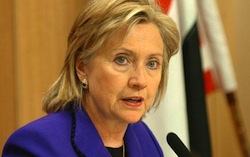NPT Review Conference Day One: US to Reveal Nuclear Arsenal Numbers
May 3, 2010
Featured Image
Today's top nuclear policy stories, with excerpts in bullet form.
Stories we're following today, Monday, May 3, 2010:
US Releasing Nuclear Data on Its Arsenal - David Sanger in The New York Times [link]
- The Pentagon on Monday will release long-classified statistics about the total size of America’s nuclear arsenal, part of an effort to make the case that the country is honoring its treaty commitments to shrink its inventory of weapons significantly, senior administration officials said Sunday.
- The American initiative will be cast by the White House as a small but significant step toward allowing the world to measure whether President Obama makes good on his promise of reducing American reliance on nuclear defenses.
- The commitment to make the figures public will be included in a speech that Secretary of State Hillary Rodham Clinton will deliver at the opening of a United Nations conference reviewing progress on the Nuclear Nonproliferation Treaty.
Barack Obama Faces Tough Task to Repair Cracks in Nuclear Dam - Joe Cirincione in The Guardian [link]
- The legal dam that has held back the nuclear floodwaters for 40 years is cracking. With 189 member countries, the nuclear non-proliferation treaty (NPT) is the sole global legal and diplomatic barrier to the spread of nuclear weapons.
- The treaty regime stifled this threat by creating an international standard against their spread, changing nuclear weapons from a source of national pride to an object of international censure.
- The regime suffered eight years of neglect under the Bush administration, which did not even feign interest in disarmament
- Obama's "nuclear spring" – a treaty with Russia, a new nuclear policy for the US and a security summit that united 47 countries in preventing nuclear terrorism – has restored that faith.
Polish Foreign Minister: We're Actually Not Worried About Iranian Missile Threat - The Cable [link]
- Missile defense is as much of a diplomatic initiative as a military one. For the Poles, they see missile defense cooperation with the United States as a great way to build defense ties.
- What Poland doesn't see is itself as a target of the missile threat from Iran, the country the nascent U.S. missile shield is supposedly designed to thwart.
- "If the mullahs have a target list we believe we are quite low on it," Polish Foreign Minister Radoslaw Sikorski said during his trip to Washington Thursday.
- Sikorski admitted that Poland's real interest in the system is to be an active player in the new emerging security infrastructure in Europe, which includes NATO's endorsement of missile defense.
What the Volcano Can Teach Us About Nuclear War - Alexandra Bell and Ben Loehrke in Good Magazine [link]
- The Icelandic menace whose name we cannot pronounce shut down air travel in Europe, with global consequences. Eyjafjallajökull, for all its volcanic fuming, can hardly even compare to a major disaster. Tsunamis, earthquakes and droughts have all done far worse—and so can we.
- People still understand that a nuclear explosion would cause unfathomable death and destruction. What they probably do not realize is that if a nuclear war broke out anywhere, the fallout would have global consequences that would kill millions of people, disrupt climate patterns, and threaten global agricultural collapse. How do we know that would happen? Volcanoes.
- Climate scientists have applied lessons from volcanic eruptions to estimate how nuclear fallout would affect the global climate. The projections aren’t good.
- The ash cloud from Eyjafjallajökull provided a dramatic example of how fragile our interconnected economy can be. We should remember that when we consider the importance of eliminating nuclear weapons.
Containing a Nuclear Iran Is the Priority - Bruce Riedel in The Daily Star [link]
- For years, the US has kept the option of a possible military strike against Iran’s nuclear facilities “on the table.” As an option however, it should not become a self-fulfilling prophecy. We need instead to develop a long-range strategy for dealing with a nuclear Iran and not box ourselves into war.
- Given Iran’s ability to retaliate for a strike against it by making the wars in Iraq and Afghanistan much worse for us, it is simply not credible that the US would use force in the foreseeable future.
- If there were any real chance of major political reform within Iran within a couple of years, buying that much time might be worth the cost. But given the regime’s control of the military, the unrest in Iran since last year’s stolen election is unlikely to bring about regime change.
- A military strike by an outside power would be unlikely to help the cause of Iranian reformists, especially if it does not have international legitimacy.
- There are dangers to an open-ended threat of force approach. Saying we will not tolerate a nuclear Iran and will use force to prevent it can become a self-fulfilling prophecy and box in decisions. There is a better way: sanctions, deterrence and containment.
A View from the Dark Side
Get Ready for a Nuclear Iran - John Bolton in the Wall Street Journal [link]
- Negotiations grind on toward a fourth U.N. Security Council sanctions resolution against Iran's nuclear weapons program, even as President Mahmoud Ahmadinejad arrives in New York to address the Non-Proliferation Treaty review conference.
- The further pursuit of sanctions is tantamount to doing nothing. Advocating such policies only benefits Iran by providing it cover for continued progress toward its nuclear objective.
- There are only two options: Iran gets nuclear weapons, or someone uses pre-emptive military force to break Iran's nuclear fuel cycle and paralyze its program, at least temporarily.
- Absent Israeli action, no one should base their future plans on anything except coping with a nuclear Iran.



